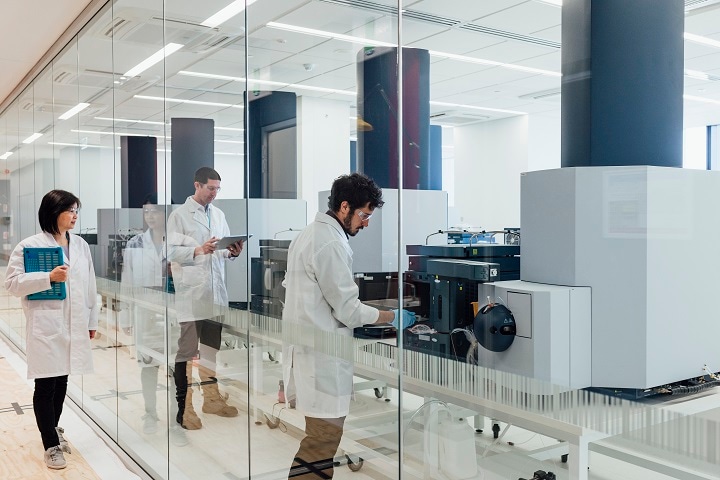Nutrition, Chronic, and Infectious Disease Laboratories
Measuring Important Markers of Nutrition and Diseases
The Nutrition, Chronic, and Infectious Disease Laboratories improve the laboratory detection and diagnosis of nutrition-related disease, cardiovascular disease, and other chronic diseases. The labs also support influenza and selected infectious disease projects.

Improving Health and Well-Being
CDC’s Division of Laboratory Sciences (DLS) provides a broad look at Americans’ nutrition status—from salt intake to trans-fatty acid levels. DLS develops special lab tests and uses them to measure nutrition markers found in blood and urine samples from participants in the National Health and Nutrition Examination Survey. The ongoing survey tracks the physical and nutritional health of adults and children in the United States.
A DLS report called The Second National Report on Biochemical Indicators of Diet and Nutrition in the U.S. Population sums up information on 58 nutrition biomarkers (short for biological marker) that are important to human health. The report helps physicians, scientists, and public health officials improve Americans’ health and well-being—including specific groups like children and women of childbearing age.
Improving Laboratory Tests and Health
Health professionals need accurate and precise laboratory measurements to correctly diagnose and treat diseases. DLS develops and improves of laboratory test methods for key chronic disease biomarkers, such as those used in tests for diabetes, kidney disease, bone disease, cancer, heart disease, hypertension, and thyroid disease. DLS also offers programs that help public health, patient care, and research labs, as well as test developers and manufacturers, to achieve accurate, consistent, and comparable test results. DLS generates data to assist with the development of clinical reference intervals to better determine patient health.
DLS provides assistance to federal and international organizations to establish and maintain reference systems needed to correctly improve and verify the accuracy of tests used in patient care and public health. DLS operates the only reference laboratory for triglycerides, glucose and free thyroxine in the U.S.
Improving Influenza and COVID-19 Vaccines and Diagnostics
DLS develops mass spectrometry-based methods to measure influenza proteins to improve the accuracy and quality of seasonal and potentially pandemic influenza vaccines, while reducing the time it takes for vaccines to become available to the public1. DLS also recently built on its success in this area by developing unique laboratory methods to measure SARS-CoV-2 proteins2. These measurements aid in the development and quality control of current and future influenza and COVID-19 vaccines and diagnostics by rapidly yielding accurate and precise protein quantification.
- Nutritional Biomarkers Branch (Division of Laboratory Sciences, CDC)
- CDC Folic Acid
- CDC Nutrition
- CDC International Micronutrient Malnutrition Prevention and Control Program (IMMPaCt)
- CDC Ensuring the Quality of Iodine Procedures (EQUIP)
- Nutrition International Folate Task Team
- Better reference intervals improve diagnoses in children
- Partnership for the Accurate Testing of Hormones (PATH)
- Influenza (Flu) | CDC
- Pandemic Influenza | Pandemic Influenza (Flu) | CDC
- Weekly U.S. Influenza Surveillance Report | CDC
- Coronavirus Disease 2019 (COVID-19) | CDC
- COVID Data Tracker | CDC
- Clinical Standardization Programs | CDC
- Performance Verification Program for Serum Micronutrients | CDC
- Performance Verification Program for the Folate Microbiologic Assay | CDC
- HC Cooper, Y Xie, G Palladino, JR Barr, EC Settembre, Y Wen, TL Williams. Limited Tryptic Digestion-Isotope Dilution Mass Spectrometry (LTD-IDMS): A reagent-free analytical assay to quantify hemagglutinin of A(H5N1) vaccine material. Anal Chem 2020 92(17):11879-11887. doi:10.1021/acs.analchem.0c02252.
- C Pierce-Ruiz, WI Santana, WJH Sutton, DA Fischler, HC Cooper, LR Marc, JR Barr, TL Williams. Quantification of SARS-CoV-2 spike and nucleocapsid proteins using isotope dilution tandem mass spectrometry. Vaccine 2021 39(36):5106-15. doi:10.1016/j.vaccine.2021.07.066.